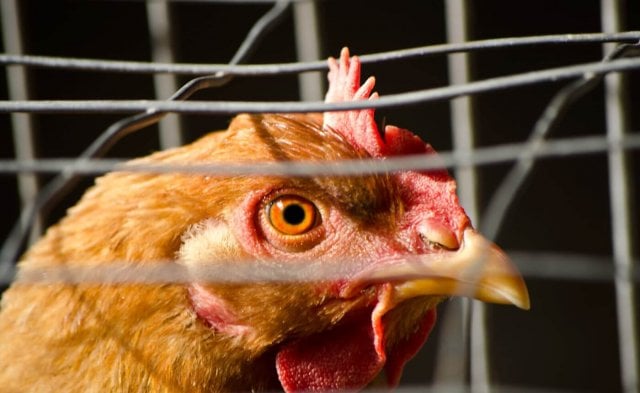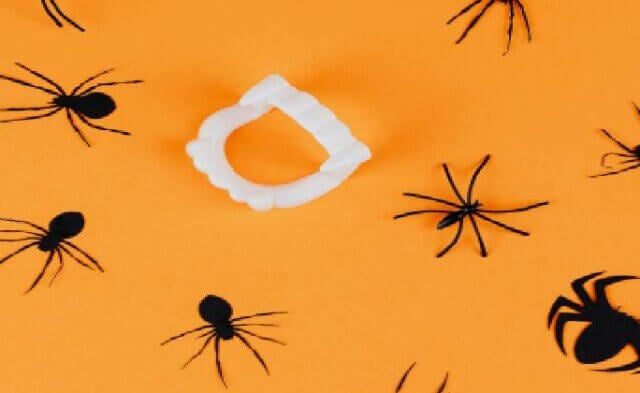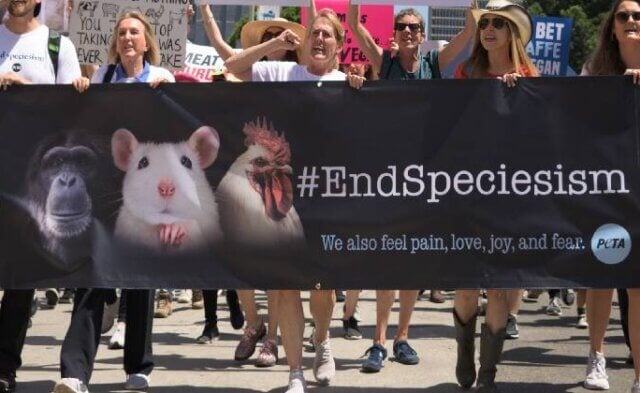How long has PETA been campaigning against leather? Let’s put it this way: Our ongoing work to make compassionate clothing the norm grabbed headlines alongside the Y2K panic, internet-enabled smartphones, and butterfly-shaped barrettes.
For over 20 years, PETA and our international affiliates have worked tirelessly to end the violent leather industry, which kills millions of cows and other animals for their skin every year. Sentient beings endure severe crowding, deprivation, castration, branding, and tail-docking, often without pain relief. The industry generates excessive toxic pollution and shares responsibility for the greenhouse-gas emissions generated by the meat industry.
PETA India was founded in response to complaints about the mistreatment of cows. Its very first campaign exposed the barbaric local leather trade: Chilies are rubbed into the eyes of hungry, exhausted cows and their sensitive tails are twisted in order to force them to walk hundreds of miles to one of the few states where it’s legal to kill them. PETA friend Pamela Anderson hosted a powerful video exposé against this practice.
Our campaign gathered steam by targeting stores that sold Indian leather. Rocker Chrissie Hynde of The Pretenders protested Gap Inc.’s “Everybody in Leather” marketing campaign by occupying the retailer’s flagship store in Manhattan along with PETA President Ingrid Newkirk and other activists. Paul McCartney then joined us, writing to India’s prime minister and urging the country to overhaul its leather industry. The very next month, Gap stopped selling Indian leather!
Many other stores also needed to learn more about leather’s origins. In late 2000, PETA’s “cow” mascot dumped a truckload of leather shoes outside London shoe chain Clarks, which sold Indian leather. From there, word spread further. By October 2002, PETA had persuaded about 40 companies—including Clarks, J.Crew, Liz Claiborne, adidas, Kenneth Cole, Nike, and Reebok—not to use Indian leather in their products.
In every anti-leather campaign, PETA reminded consumers that a leather-free wardrobe isn’t just compassionate—it’s also mega-fashionable. Alicia Silverstone “pleathered” herself in a series of stunning photos for PETA, which received international attention. While we were talking about compassionate fashion, we hopped across the seas to an International Fashion Fair in Tokyo, where we reminded attendees that “Animal Skin Is Out.”
At the Sundance Film Festival, movie buffs can discuss films ’til the cows come home. So PETA demonstrators steered the spotlight back onto cows by posing “in the buff” with signs protesting leather. Film fans realized that if they wanted to make a hero’s journey—like their favorite film’s protagonist—they should choose cruelty-free clothing or wear nothing at all.
Our demonstrators wore the same outfit—the skin they were born in—to the White House shortly afterward and posed behind a sign that declared, “We’d Rather Bare Skin Than Wear Skin.” Soon after, Gucci banned Indian leather, too.
The movement toward cruelty-free clothing took PETA to some unique places, including the Mid-Atlantic Leather Weekend in D.C. There, we were pleased to see that many of the vendors sold vegan options. In 2003, we showed that it’s chic to be kind by hosting a fashion show at New York Fashion Week. We brought “fashion police” to a subsequent New York Fashion Week: Our animal-friendly officers issued citations to attendees who made the unfashionable decision to wear skins.
Longtime PETA friend Joaquin Phoenix made headlines in 2005 for insisting on vegan leather boots when playing Johnny Cash in the biopic Walk the Line. A decade later, Joaquin worked with us to expose the hideous dog leather trade in China, via a powerful public service announcement.
The fashion world really pricked up its ears when we teamed up with Stella McCartney in 2012. The trendsetting designer hosted our leather industry exposé, which opened the eyes of millions online. Now, her vision of a cruelty-free clothing universe excites consumers around the world.
PETA’s list of vegan leather victories grows every day. Recently, we succeeded in pressuring Uber to drop its requirement of leather seats for high-end cars. Now, several luxury car companies offer leather-free seats. We still have a long way to go, but we’re getting closer every day, as more consumers learn about the reality of this violent industry and more vegan options abound.
Were you inspired by PETA’s fight for compassionate fashion? Help us bring about a future of solely cruelty-free clothing by adding your voice to our anti-leather campaigns:





